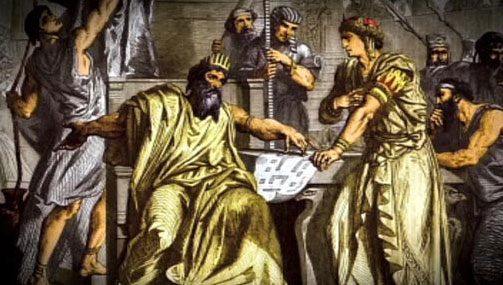The Biblical monarchy was a very unique and all-encompassing powerful position!

By Rabbi Ari Enkin, rabbinic director, United with Israel
The Torah’s system of governance is exceptionally unique. This is because if one examines the Torah closely, one will notice that it combines democracy, theocracy, and monarchy all in one complete legal system. In this article we’ll examine what the Torah and Talmud have to say about the King of Israel.
Among the mitzvot (commandments) that the Jewish people were commanded to fulfill upon their arrival in the Land of Israel was to appoint a king to lead them. There were a number of kings who ruled over the Jewish people throughout history, and while some of them were righteous and noble, others were corrupt and evil.
The appointment of a king was done in cooperation with the Sanhedrin, the supreme religious court of 70 sages, along with the acting prophet of the time. The king of Israel must be a male who was born to a Jewish mother. Converts may not serve in the capacity of king.
The person who is appointed king must be one who had served previously in honorable professions only. The succession to the throne is passed down to the king’s children, who will serve as king when their father passes away. As a general rule, only those from the tribe of Judah were appointed to serve as kings. So, too, the Messiah will be a descendant of Judah.
Ultimate Respect for the Monarch
Everyone is obligated to honor and fear the king. It is forbidden for anyone other than the king to make use of any of his possessions. As such, one may not ride the king’s horse or sit upon his throne. In fact, when a king dies, all his clothes are burned in order to ensure that no one makes use of them. No one is ever permitted to marry a woman who was once married to a king.
It is never permitted to see the king naked or while he is getting a haircut. In fact, a king is required to have his hair trimmed daily and must always ensure that his appearance and presentation is befitting his position. He is not permitted to forgo the honor due to him even if he wishes to do so. When appearing before a king, one is required to bow down to him.
King Must Remain Humble and God-Fearing
A king must ensure that his status does not lead him to arrogance. Indeed, a king must constantly work on himself to ensure that he is exceedingly humble. He should be compassionate and kind – even to children. He must always speak gently to everyone.
That being said, the king has the power to have anyone killed for almost any reason he sees fit. This includes, of course, one who does not follow his laws. The estates of those who are killed by decree of the king are transferred to the king as well. The king is allowed to impose taxes as he sees fit, and those who do not pay can be severely punished or killed should the king decide to do so.
The king is obligated to have two Torah scrolls in his possession, at least one of which must be written especially for him and his reign. One of these Torah scrolls is kept in his treasury, while the other must accompany him at all times. He may not have more than 18 wives, including concubines. Concubines also served as cooks, bakers and perfumers.
Corruption Not Tolerated
A king is forbidden to amass more horses than necessary. Neither is he permitted to collect excessive amounts of money, but rather, he is limited to the amount needed to pay those who serve him. All extra monies that the king generates must be placed in the public coffer. A king may never get drunk. He is to spend his free time studying Torah and tending to the nation’s needs.
